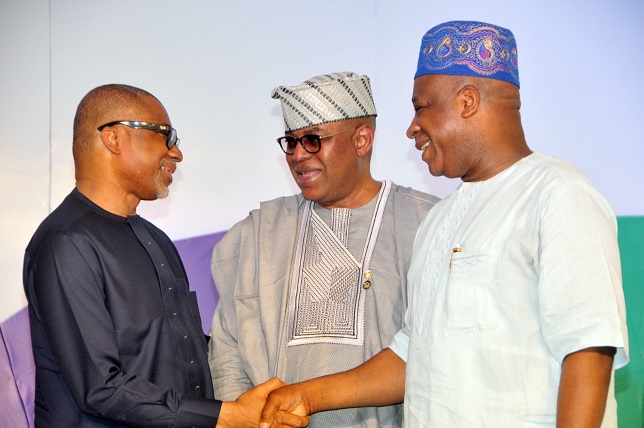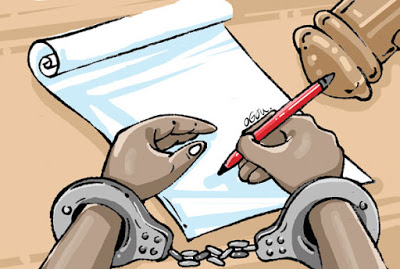Preliminary View
Arbitration is an old
dispute resolution mechanism. Some authors have traced its adoption to the
reign of King Solomon in the Bible. It is recorded that the dispute between the
two women over the living son was resolved by Kind Solomon in a manner consistent
with arbitral proceedings. Modern arbitration has proved useful in many
respects in commercial and industrial dispute settlement. Arbitration is partly
regulated by law (in terms of form and procedure), it is however largely based
on agreement by parties.
Arbitration agreement
simply implies that parties shall resolve any dispute arising from their
agreement by an arbitral panel and be bound by the decision from resolution.
When parties freely enter into an arbitration agreement, either of the parties
cannot resolve a dispute by resorting to a regular court. Where a party sues in
court, the other party can object to the suit and pray that the judicial
proceedings be stayed (i.e. put on hold) and urge the court to refer the
dispute to arbitration in accordance with the agreement of both parties.
However, agreement on
arbitration, like other private arrangements, may suffer failure from
unenforceability in some circumstances. Such circumstances are only called into
question when the court has to determine the defendant’s objection to the suit
or application for stay of judicial proceedings in order to enable parties
settle their dispute by arbitration in accordance with their agreement. One of
such circumstances is when the defendant “takes a step” in the judicial
proceedings rather than objecting or before objecting to the suit. In the said
circumstance, the defendant would be deemed to have taken steps and as such has
waived his right to insist on the arbitration agreement. The court would not
recognize the agreement that dispute be resolved by arbitration. What
constitutes these “steps” has however not been a subject of a settled law in
the Nigeria.
It would appear that the
decision of a court on the question of what amounts to taking steps will turn
of the peculiarities of the facts of each case. The determining factor is
whether the step taken is so clear as to amount to a total waiver or
abandonment of the right to insist on arbitration agreement. The foregoing will
ultimately turn on the following:
- (a) the nature of the process (if any)
filed by the defendant or any other act or conduct undertaken by the
defendant before raising the objection on ground of arbitration agreement
and/or applying for a stay of proceedings; and
- (b) the inconsistency of any
such step taken with the application for stay of proceedings to such
extent as to make the court to conclude that the right to apply for stay
of proceedings ought to be deemed to have been waived.
-
There is an uncertainty in
the state of the law. The misfortune created by uncertainty in the state of the
law appears to have stemmed from the blanket pronouncement of Fatai-Williams
JSC in the case of Obembe v. Wemabod Estates to the effect that “A
party who makes any application whatsoever to the court, even though it be
merely for application for extension of time, takes a step in the proceedings”.
A review of the line of
subsequent cases would provide insights into the misunderstanding of the facts
and decision in the Obembe’s case leading to the pronouncement made by
Fatayi-Williams CJN.
The First Step Taken
The checkered history of
the concept of taking steps before making an application for stay of
proceedings in Nigerian courts began with the case of Obi Obembe v. Wemabod
Estates Ltd. (1977) All NLR 130. If there was any earlier Nigerian case on
the point, it was neither referred to nor considered in the Obembe case.
In the Obembe case,
the appellant sued the respondent in the High Court of Lagos State for wrongful
termination of appointment as a consulting engineer claiming balance of fees
and reimbursable expenses for engineering work done in respect of a building
project for the respondent. The disagreement arose from their differences in
the quantity of steel recommended by the appellant for the project. The amount
claimed was based partly on the scale of fees laid down in a booklet published
by the Association of Consulting Engineers in London (Exhibit 3).
The respondent defended
the suit and did not file any motion for stay of proceedings even though clause
17 in part 11 of Exhibit 3 contained reference to arbitration in case of
dispute. In the judgment of the High Court, the appellant’s case was dismissed
on the ground that the appellant did not prove his case as he did not lead any
evidence or put in any document to support his case. However, the judge went
further to observe that even if the appellant succeeded in proving the amount
claimed, he (the judge) would have been unable to enter judgment in his favour
in view of clause 17 in part 11 of Exhibit 3.
On appeal to the Supreme
Court, it was held that the lower court was in error to have made the
observation. It is in the judgment of the Supreme Court that Fatayi-Williams
CJN made the general statement that has generated the confusion in the state of
the law regarding what constitutes steps before making application for stay of
proceedings pending arbitration. His lordship said at page 141 that:
“In order to get a stay, a
party to submission must have taken NO step in the proceedings. A party who
makes any application whatsoever to the court, even though it be merely for
application for extension of time, takes a step in the proceedings. Delivery of
a statement of defence is also a step in the proceedings.”
(Emphasis mine)
It is consoling, at least
for the purpose of permitting a distinction between the Obembe case and
other cases, that the Supreme Court itself stated the peculiarities of the Obembe’s
case to indicate the limited usefulness that the statement of Fatayi-Williams
CJN can serve in determining what constitutes steps in a proceedings when the
court observed at page 141 that:
“No stay was asked for the
defendants/respondents after they were served with the writ of summons. On the
contrary, they accepted service of the statement of claim, filed their own
statement of defence, testified in their defence, and took part in the
proceedings.”
Other Steps Taken So Far
It is important to review
few of the cases in which the courts have had opportunity to determine what
constitute steps in a judicial proceedings to defeat the right of a defendant
to insist that the dispute in a judicial proceedings be referred to
arbitration.
1.
K.S.U.D.B. v. Fanz Construction Ltd
(1990) 4 NWLR (Pt. 142) 1.
On the day this case came
up in Court, the defendant’s counsel applied to Court for an order of pleadings
and the Court ordered pleadings to be filed, giving plaintiff twenty-one (21)
days and defendant forty (40) days as requested by counsel. The Plaintiff filed
a statement of claim accordingly. Thereafter the defendant applied for stay of
proceedings. The application was rightly refused.
1.
Fawehinmi Construction Co. Ltd. v. O.
A. U [1998] 6 NWLR (Pt. 553) 171.
In 1998, the Supreme Court
had a golden opportunity to lay down the rule and correct the palpable error
that may arise from the wholesale adoption of the blanket judicial statement of
Fatayi-Williams CJN in the Obembe case. The opportunity arose in Fawehinmi
Construction Co. Ltd. v. O. A. U. But rather than overruling itself, the
Supreme Court towed the easier path of distinguishing the Obembe case
from the Fawehinmi case and held that the Obembe case has no
application to the case before it, thus, living the state of the law hazy and
susceptible to erratic interpretations of the sweeping statement of
Fatayi-Williams CJN in Obembe case.
In the Fawehinmi
case, the appellant (as plaintiff) took out a writ of summons against the
respondent (as defendant) claiming damages for breach of contract and wrongful detention
of its plants and machinery. On the same day the writ of summons was filed, the
appellant also filed a motion for mandatory injunction compelling the release
of its plants and machinery which motion was fixed for hearing on 3rd June
1987. On 25th May 1987, the respondent filed a motion for stay of proceedings
pending reference to arbitration in accordance with Clause 35 of the contract
between the parties. The motion for stay of proceedings was argued and was
later dismissed. Thereafter, the Court adjourned for hearing of the substantive
suit.
The appellant filed a
Statement of Claim and served same on the respondent. The respondent did not
file any Statement of Defence but rather it raised the issue that the suit was
not properly before the Court on ground that Section 46 of the University of
Ife Edict on pre-action notice was not complied with. The High Court overruled
the objection holding that the respondent had waived his right by taking steps
in the proceedings. The respondent’s appeal to the Court of Appeal was upheld
and the appellant’s suit was struck out by the Court of Appeal. The appellant’s
appeal to the Supreme Court was refused.
It is noteworthy that,
though the defendant in this suit went beyond arbitration agreement by invoking
statutory provision in order to make the suit incompetent, the Supreme Court
nonetheless held that the trial court ought to have upheld the objection to the
suit on ground that the plaintiff did not comply with the arbitration clause in
their contract.
On what amounts to “taking
a step in a proceeding”, the Supreme Court held at pages 183 – 184 as
follows:
“Now by appearing before
the trial in a court to raise preliminary issue of clause on arbitration to be
resorted to first before the trial in a court of law, could the defendant be
said to have waived its right? When parties enter into agreement and there is
an arbitration clause whereby the parties must first go for arbitration before
trial in Court it is natural for the defendant in a case where the other party
has filed a suit to ask for stay of proceedings pending arbitration. That does
not amount to submission to trial. In the case where such application is
refused the next step is to invoke a statutory right where it exists if that
right will make the suit incompetent. In the present case, s. 46(1) of the
Edict, (supra) was invoked by the defendant and the learned trial judge held it
was too late and that the defendant had waived its right. The right under
s.46(1) is very wide. Waiver is not all that simple, appearance by way of
demurrer is not enough to amount to waiver. When party has a right whether by
way of agreement or under statute he can exercise it at the earliest time and
can equally waive it if the statutory right is not absolute and mandatory. The
waiver must be clear and unambiguous like allowing all evidence to be taken or
even decision given before challenging the hearing. It will then be shown that
the party, deliberately refused to take advantage of the right when it availed
him. Such failure to take advantage of a right must be so clear that there will
be no other reasonable presumption than that the right is let go. The
preliminary skirmishes in this case at the trial Court could not by any
imagination be presumed to be a waiver. The defendant had not filed his
statement of defence and service of the statement of claim on it is certainly
not a waiver by it. Had it filed a statement of defence but with indication
that the preliminary objection will be raised that the suit was not properly before
the Court, it would not (sic) have been a waiver. This would have distinguished
the dictum in Kano State Urban Development Board v. Fanz Construction Ltd.
(1990) 4 NWLR (Pt. 142) 1. It is therefore clear, that the defendant had not
taken any step in having the case heard by the trial Court and had not waived
its right under s.46(1) of the Edict. Obembe v. Wemabod Estates Ltd. (1977) 5
SC 115, 131-2 has no application in this case. There is no evidence of waiver
in this case.”
Of particular interest is
the dictum of the Court of Appeal in the above case quoted with approval by
Ogundare JSC (in the concurring judgment) at page 187 of the report. It was
held as follows:
“It is not enough to say
that the appellant entered an unconditional appearance and therefore he has
waived his (sic) right to complain about jurisdiction. The decision in Muni v.
Worsfold (supra) which was followed in the case of U.B.A. Trustees Ltd. v.
Nigergrob Ceramic Ltd. (sura) has determined that entering an appearance, even
unconditional, does not constitute a waiver of the right to object. It is
therefore not enough to say that the appellant having entered unconditional
appearance cannot raise the objection on the decision of the court. For it is
clear from the record that as soon as the appellant entered appearance, the
first step taken by its counsel was to protest against the jurisdiction of the
court by seeking a stay of its proceedings with a view to referring the case to
arbitration as set out in the agreement between the parties. The only step
taken after appearance therefore by the appellant was to protest against the
court hearing the case. If any step could be said to have been taken. (sic) it
is only in protestation.”
3. Confidence Insurance
Ltd. v. Trustees of O.S.C.E. (1999) 2 NWLR (Pt. 591) 373
In this case, upon the
commencement of the suit and service of the originating process, parties
exchanged pleadings. In its statement of defence, the appellant averred that
the respondent’s action was premature as the respondents did not exhaust
arbitration as agreed in the trust deed before resorting to litigation.
Judgment was entered against the appellant and he appealed against the refusal
to stay proceedings. The appeal was dismissed with the following dictum at page
388 paragraphs A-D as follows:
“While certain acts done
by a party may or may not constitute steps in the proceedings,
nevertheless some acts will surely be construed to mean “taking steps in the
proceedings.” For example, exchange of correspondence between parties or their
counsel after entering appearance or efforts made out of court to settle the
matter in controversy between the parties or moving the court to seek a
party’s desire that the matter be placed before arbitration panel cannot
ordinarily amount to taking other steps in this proceedings as to defeat a
party’s right to rely on the arbitration provision.”
4. M. V. Lupex v. N. O.
C. (2003) 15 NWLR (Pt. 844) 469
The next case to be
considered is the case of M. V. Lupex v. N. O. C. The dispute in this
case arose between the parties in respect of a charter-party agreement which
contained a clause that disputes should be resolved by arbitration. The
Respondent sued the Appellant at the Federal High Court claiming damages for
breach of the charter-party and thereafter obtained an order ex parte
for the arrest of the chartered vessel (M.V. LUPEX) which at the time had
berthed at the port of Warri. On becoming aware of the ex parte order,
the Appellant filed a motion on notice for the following orders:
1.
An order setting aside the order for the
arrest of the vessel, alternatively;
2.
An order for the release of the arrested
vessel unconditionally or upon such terms as the Court may direct;
3.
An order for stay of proceedings in the
suit sine die.
The Federal High Court
held that it had jurisdiction and refused the Appellant’s prayer to stay
proceedings. Also, the Court released the vessel on monetary condition. The
Appellant appealed to the Court of Appeal. The Court of Appeal dismissed the
appeal. The Appellant further appealed to the Supreme Court. The Supreme Court
allowed the appeal and granted stay of proceedings sine die to enable
parties resort to arbitration.
Mohammed JSC held at pages
488-489:
“Taking into consideration
all what I have considered above in this judgment, it is crystal clear that the
trial High Court could only have acted judicially and judiciously if it
exercised its discretion by ordering a stay of proceedings in the case at hand.
It is abundantly clear that the trial court had acted on wrong principles of
law and that it misapprehended the facts of this case when it refused to grant
the appellant’s application for stay of proceedings of the action filed before
it by the respondent. The court below is therefore in error to affirm the
decision of the trial Federal High Court in refusing to grant a stay of
proceedings.”
5. Enyelike v. Ogoloma
(2008) 14 NWLR (Pt. 1107) 247
In Enyelike v. Ogoloma,
the dispute arose between the parties from a lease agreement which contained an
arbitration clause. The Respondent sued the Appellant on 14th March 2000 before
the High Court of Rivers State contrary to the arbitration agreement. On 22nd
February 2000, the Appellant filed a Notice of preliminary objection seeking to
dismiss the suit. Thereafter the Appellant filed a conditional appearance out
of time and a motion for extension of time to file and serve his statement of
defence and counterclaim dated 12th February 2001. The Appellant pleaded the
arbitration agreement in his statement of defence and counterclaim.
The High Court of Rivers
State held (quoted at page 254 of the report) as follows:
“As can be seen in all the
authorities to above, there is something that a party to an arbitration cannot
do……he must not have taken any tangible step in the proceedings or as section 5
of the Arbitration Law, cap 10 put it, “taking any other steps”. In this
instant matter, the defendant/applicant not only entered a conditional
appearance out of time, after filing a motion for to enter appearance out of
time, but filed a motion on notice for an extension of time within which he can
file and serve his statement of defence and counterclaim dated 12/2/2001, and
this motion dismissing (sic) the suit for lack of jurisdiction. All these constitute
an act of “taking any other steps” committed by the defendant/applicant and
having done so, he cannot be heard to raise the issue of non-compliance with
the arbitration clause.” (Emphasis mine)
The Court of Appeal, Port
Harcourt agreed and held at pages 257-258 as follows:
“By virtue of the
provisions of subsection (1) of section 5 of the Arbitration and Conciliation
Act (supra), either the appellant or the respondents have the right to, at any
time after entering an appearance but before filing any pleadings (including
statement of defence) or taking any other steps (e.g. filing of motions etc),
apply to the court to stay proceedings. In the instant case, it’s rather
obvious that the appellant having already deemed it fit or expedient to file
(i) a statement of defence (ii) a counter claim to the respondents’ suit, it
was rather most inappropriate, to say the least for him to file the notice of
preliminary objection in question seeking that the suit be dismissed.”
(Emphasis mine)
6. Onward Enterprises
Ltd. v. MV Matrix & Ors (2010) 2 NWLR (Pt. 1179) 530
This is another case in
which the Court of Appeal did not follow the hardship in Obembe case
though distinguished the earlier case from the present one. The appellant (as
plaintiff) sued the respondent claiming damages for breach of contract of
affreightment and obtained an ex parte order on 2nd July 2002 for the
arrest and detention of the respondent’s vessel (M.V. Matrix). On 15th July
2002, the respondent filed two applications. While the first application was
for release of the vessel, the second application sought to shift the vessel to
anchorage pending the hearing of the application for release. The appellant
consented to the release of the vessel on 26th July 2002. On 11th July 2003,
the respondent filed a motion for stay of proceedings pending reference to
arbitration in London. The Court granted the motion for stay of proceedings.
The Court of Appeal at
page 551 took a step to state certain steps which can be regarded as waiver of
the right to insist on arbitration agreement wherein Mshelia JCA held as
follows:
“In the instant case,
respondents entered conditional appearance and filed two motions on notice
before the application for stay. One sought the release of the vessel, while
the second sought an order to shift the vessel to anchorage. The application
for stay of proceedings was the third application filed by the respondents. For
the appellant, the application to shift the vessel in particular amounts to a
step taken in the proceedings. It is evident from the record that the
respondents did not file any statement of defence nor applied for extension of
time to file any statement of defence. I agree with the submission of
respondents’ counsel that neither the application for the release of the vessel
nor the application to shift the vessel to anchorage pending the determination
of the application to release her from arrest constitute steps taken within the
contemplation of section 5 (1) of the Arbitration and Conciliation Act. It is
only acts done in furtherance of the prosecution of the defence that could be
said to amount to steps taken in the proceedings.”
7. Nissan (Nig.) Ltd. v.
Yaganathan & Anor (2010) 4 NWLR (Pt. 1183) 135.
The dispute in this case
arose from a contract in restraint of trade between the 1st Respondent and the
Appellant (his former employer). The contract contained arbitration clause. The
Appellant sued the 1st Respondent at the High Court of Lagos State for taking
up a new employment with the 2nd Respondent. On being served with the writ of
summons and other court process, the Respondents filed a notice of preliminary
objection seeking orders:
1.
To strike out the suit against the 2nd
Respondent for non-disclosure of a reasonable cause of action and for being
improperly joined in the suit;
2.
To strike out the suit for being
incompetent and non-compliant with the arbitration agreement; and
3.
For such further orders as the Court may
make in the circumstances.
The High Court granted
prayers (i) and (ii). Also, the Court stayed further proceedings in the suit
which was not one of the prayers in the notice of preliminary objection. At the
Court of Appeal, Lagos, one of the issues was whether the High Court was right
to grant a relief not claimed. The Court of Appeal allowed the appeal in part,
holding at pages 156-157 as follows:
“From decided authorities,
it is clear that the application to refer the matter to arbitration would
succeed if the application is made at any time after the applicant enters
appearance but before filing pleadings or taking any other steps in the
proceedings. In this case, the respondents entered conditional appearance on
15th January 2007 and the next day, 16th January 2007 filed a preliminary
objection seeking order of the court striking out the suit for non-compliance
with the arbitration clause. It ought to have been not for striking out the
suit, but for stay of proceedings to enable the parties go to arbitration. …………
The order granting a stay of proceedings pending resolution of their disputes
by arbitration as agreed between the parties is correct notwithstanding that
the respondents asked that the suit be struck out.”
8. Williams vs Williams
& 3 Ors. (2013) 3 CLRN 114.
The Appellant petitioned
for the winding up of the 4th Respondent on the grounds of alleged commission
of sundry illegalities by the 1st and 2nd Respondents, the alter ego of the 4th
Respondent; and the oppressive and discriminatory conduct of members of the 4th
Respondent in relation to the running of the affairs of the 4th Respondent.
Pursuant to section 5 of
the ACA, the 1st and 2nd Respondents filed a motion for stay of proceedings
pending arbitration as agreed by parties. Before the motion was heard, counsel
to the 1st and 2nd Respondents did the following:
(a) orally applied to the
court for an adjournment;
(b) gave an undertaking in
respect of a pending motion on notice in the substantive suit; and
(c) prayed the trial court
not to grant the prayers of interim injunction in the terms sought by the
Appellant.
The Appellant contended
that the 1st and 2nd respondents took steps in the substantive suit in view of
the above. The foregoing contention notwithstanding, the court upheld the 1st
and 2nd Respondents’ motion and stayed its proceedings in the matter pending
arbitration. The court further directed the Appellant to commence arbitral
proceedings pursuant to the parties’ written agreement. Dissatisfied with the
ruling of the trial court, the Appellant appealed to the Court of Appeal where
the Appellant, relying on the Obembe’s case, forcefully contended that the 1st
and 2nd Respondents had taken a step in the proceedings. Accordingly, the
Appellant submitted that the 1st and 2nd Respondents had lost their right to
ask for a stay of proceedings pending arbitration. The Appeal was refused.
9. S. A. & Ind. Co.
Ltd. v. Ministry of Finance Incorp (2014) 10 NWLR (Pt.1416) 515.
The dispute in this case
arose from a contract for supply of fertilizer between the 1st Appellant and
Kano Government (represented by the 2nd Respondent). The contract contained
arbitration clause. The Respondents sued the Appellants at the High Court of
Kano State for balance due under the agreement and for damages. Upon being
served with the originating process, the appellants filed their respective memorandum
of conditional appearance under protest. Thereafter, without delivering
pleadings, the appellants filed a motion for stay of proceedings pending
arbitration (though the third appellant filed a motion to strike out the
suit).
The High Court refused the
application for stay of proceedings. The Court of Appeal overruled the lower
court and granted stay of the proceedings. Nothing is said about taking step as
it was not in issue. However, the Court adopted the views expressed in Confidence
Insurance Ltd. v. The Trustees of Ondo State College of Education Staff Pension
(1999) 2 NWLR (Pt. 591) 373 at 386-387 paragraphs C-G where Achike, JCA as
follows:
“It is perfectly clear to
me that mere entering an appearance by the appellant, be it conditional or
unconditional appearance, is not controlling nor relevant to the party’s right
to rely on the arbitration clause inserted in the parties’ agreement. On the
contrary, it is in fact what happens after a party has entered an appearance
that matters in determining whether or not such a party can still take
advantage of the aforesaid arbitration clause.”
Making a Case against Obembe
v. Wemabod
In the determination of
the application to stay judicial proceedings in order that parties may go to
arbitration, the relevant question the court should consider is whether the
party applying for stay is “guilty” of doing something in the judicial
proceedings which negates his application for stay of judicial proceedings so
as to constitute waiver of his right to insist on arbitration. If the question
is answered in the affirmative, the application for stay of judicial
proceedings should be refused. Otherwise, stay should be granted.
However, the determination
of whether the particular step taken qualifies for waiver is not a simple
straight-forward task particularly in the face of Obembe case. Although,
as already indicated in the list of cases considered above, the courts have
done well in some cases by distinguishing the peculiarities in the Obembe case
from the one being decided to avoid the application of the sweeping statement
of Fatayi-Williams CJN that “A party who makes any application whatsoever to
the court, even though it be merely for application for extension of time,
takes a step in the proceedings”. The Obembe case still appears to
be a law to which a lazy recourse can be easily had where there is no judicial
willingness to distinguish the facts of the case being decided from those in Obembe
case to avoid the application of the far-reaching statement of
Fatayi-Williams CJN.
With due respect, the Obembe
case is not a useful authority for any issue bordering on whether a party
has taken steps that constitutes waiver. Also, the popular statement of
Fatayi-Williams CJN is not a statement of the law, rather it is a statement
made in error as it arose from the Supreme Court’s determination of a ground of
appeal complaining against an observation made in passing by the trial
judge. The trial judge observed that “Had I been in a position on the facts
to find any of the plaintiff’s claims proved I would have been unable to enter
judgment in his favour in view of the Arbitration Clauses 17 of Exh. 3 at page
37 which parties had agreed would govern their contract.” The foregoing
observation of the trial judge, in my respectful view, is an obiter dictum
as it did not form the basis of his dismissal of the plaintiff/appellant’s
case.
The law is trite that it
is only against the ratio decidendi in a judgment and not an obiter
dictum that an appeal (if any) can be lodged. The Supreme Court in A.I.C.
LTD V. NNPC (2005) 22 NSCQLR 903, at 925 (2005) 5 SC (PT. 11) 60 defined ratio
decidendi and obiter dicta as follows: “The ratio decidendi
of a case represents the reasoning or principle or ground upon which a case is
decided. Obiter simply means in passing, incidental, cursory. Obiter dicta
reflects, inter alia, the opinions of the Judge, which do not embody the
resolution of the Court.”
The ground and issue
formulated by the appellant in the Obembe case in respect of the
observation made by the trial judge ought to have been struck out by the
Supreme Court for being incompetent. Failure to strike out the ground and the
issue led to the popular statement by Fatayi-Williams CJN that “A party who
makes any application whatsoever to the court, even though it be merely for
application for extension of time, takes a step in the proceedings”. In CHAMI
V. UBA PLC. (2010) 6 NWLR (PT. 1191) 474 at 493 PARAGRAPHS E- F, the
Supreme Court made the point so clear that grounds of appeal must attack the ratio,
when it held thus: “It is settled law that issues for determination
must be distilled from Grounds of Appeal which Ground(s) must attack the ratio
decidendi of the judgment not anything said by the way, or obiter dicta or be
formulated in vacuo, as issue 5 in the instant case.” It is therefore my
humble view that the statement of Fatayi-Williams CJN was made per incuriam
which ought to be overruled or jettisoned by subsequent courts. It must be
noted however that even though the Supreme Court can depart from or overrule
the Obembe case, the Court of Appeal and all other inferior courts are
bound by it.
Generally speaking the
Supreme Court may depart from or overrule its previous decision under certain
circumstances and in accordance with laid down principles of law, such as where
it is shown or demonstrated that the earlier decision is either erroneous in
law, or given per incuriam or that it has become an instrument of
injustice etc, see Veepes Industries Ltd vs Cocoa Industries Ltd (2008) ALL
FWLR (Pt.425) 1667 at 1687; Bakare v. NRC (2007) ALL FWLR (Pt.391) 1663. In
addition to the above, where the decision complained of hinders the proper
development of the law (e.g. the law of arbitration) in which a broad issue of
public policy was involved, the Supreme Court may depart from such a decision.
It is therefore my humble submission that the decision in Obembe case
should be overruled by another panel of the Supreme Court for being a major
impediment to the development of arbitration law in Nigeria.
The Way the Law should Go
It is clear from the
totality of cases considered that if the arbitration law must develop and be
seen to be developing in Nigeria, the court should be more inclined to granting
stay of arbitration than refusing it. The steps that a defendant is alleged to
have taken in a judicial proceeding to defeat his right to arbitration must be
so clear and positive as to constitute a waiver of his right to insist on the
resolution of the dispute by arbitration. The following steps have been
highlighted, though not exhaustive, on what a defendant can do to frustrate his
right to go to arbitration, namely:
1.
filing an affidavit in opposition to
summons or motion for summary judgment, or
2.
filing and/or service of a statement
defence, or
3.
filing an interpleader summons, or
4.
filing of a counterclaim, or
5.
filing an application for leave to serve
interrogatories, or
6.
filing an application for stay of
proceedings pending the giving of security or costs
7.
filing an application for extension of time
to file and/or serve a statement of defence
8.
filing an application for an order for
discovery
9.
filing an application for an order for
further and better particulars,
10.
filing a motion to commence a third party
proceeding

















